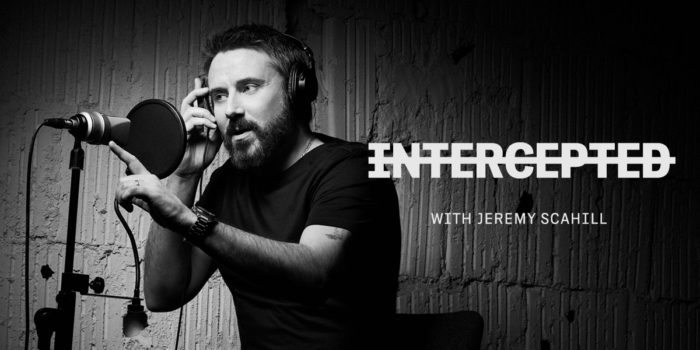
Intercepted Podcast (4/3/19)
A new series from The Intercept, “The Threat Within,” takes a deep dive into examining federal terrorism prosecutions in the United States since 9/11. This week on Intercepted: The Intercept’s Alice Speri discusses her investigation into the FBI’s creation of the term “black identity extremist” and explains why this label is so dangerous.
Science fiction author Cory Doctorow walks us through the dystopian, yet highly plausible, futures in his new book “Radicalized.” Doctorow also breaks down the newly passed European Copyright Directive and its implications for the internet as we know it.
Plus, Katie Alice Greer of the band Priests describes how history and mythology influenced their new record, “The Seduction of Kansas.”
Link to Story, Transcript and 51-Minute Audio
*****
Terrorism’s Double Standard
“We clearly have domestic terrorist groups in the United States. We just don’t call them terrorist groups. …We’re just much more experienced and comfortable with exporting that label, with seeing terrorism as something that comes only from the outside.”
By Trevor Aaronson
The Intercept (3/23/19)
On a narrow street in Charlottesville, Virginia, James Alex Fields Jr. pressed the accelerator of his gray Dodge Challenger. Dozens of people were walking in front of him. They had come to protest Fields and hundreds of other white supremacists who’d descended on this pleasant Southern college town for the “Unite the Right” rally in August 2017.
“Our streets!” the protesters chanted in response to the white supremacists. “Our streets!”
When some protesters realized the gray car wasn’t stopping, they screamed. Then came the scrapes and thuds and finally a crash as Fields barreled into the crowd, sending people into the air and diving for safety, before the Dodge slammed into the back of another car.
“Holy shit!” one of the protesters said. “That Nazi just drove into people. Oh my God! We need paramedics right now!”
The double standard has had powerful consequences for how the FBI allocates counterterrorism resources, leading invariably to international threats being prioritized over domestic ones.
Fields then shifted the car into reverse and backed out toward the main road, the front bumper scraping the pavement and the engine squealing.
Heather Heyer, a 32-year-old Charlottesville resident, was killed in the attack. At least 19 others were hurt.
Fields, a 20-year-old from Ohio who had been open about his racist views since high school, had marched in Virginia with the white supremacist group Vanguard America. He was charged in Virginia state court with murder and in federal court with hate crimes. He was not charged as a terrorist, despite then-Attorney General Jeff Sessions having initially described the Charlottesville attack as meeting “the definition of domestic terrorism.”
Avoiding the word
In announcing Fields’s federal indictment 10 months later, however, Sessions avoided using the word “terrorism” altogether, saying instead that the Justice Department remains “resolute that hateful ideologies will not have the last word and that their adherents will not get away with violent crimes against those they target.”
An Intercept analysis of federal prosecutions since 9/11 found that the Justice Department has routinely declined to bring terrorism charges against right-wing extremists even when their alleged crimes meet the legal definition of domestic terrorism: ideologically motivated acts that are harmful to human life and intended to intimidate civilians, influence policy, or change government conduct.
If Fields had been a Muslim aligned with an international terrorist group, the Justice Department almost certainly would have handled his case differently. …
Read the Rest and Interactive Terrorism Quiz


